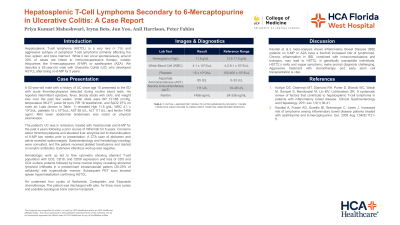Monday Poster Session
Category: IBD
P2733 - Hepatosplenic T-Cell Lymphoma Secondary to 6-Mercaptopurine in Ulcerative Colitis: A Case Report
Monday, October 28, 2024
10:30 AM - 4:00 PM ET
Location: Exhibit Hall E

Has Audio

Priya Kumari Maheshwari, MD
University of Central Florida, HCA Healthcare GME
Pensacola, FL
Presenting Author(s)
Priya Kumari Maheshwari, MD, Peter Fahim, MD, Iryna Bets, MD, Jun Yoo, DO, Anil Harrison, MD
University of Central Florida, HCA Healthcare GME, Pensacola, FL
Introduction: Hepatosplenic T-cell lymphoma (HSTCL) is a very rare (< 1%) and aggressive subtype of peripheral T-cell lymphoma primarily affecting the liver, spleen, and bone marrow. While it can occur spontaneously, around 30% of cases are linked to immunosuppressive therapy, notably thiopurines like 6-mercaptopurine (6-MP) or azathioprine (AZA). We describe a 53-year-old male with Ulcerative Colitis (UC) who developed HSTCL after being on 6-MP for 3 years
Case Description/Methods: A 53-year-old male with a history of UC since age 15 presented to the ED with acute thrombocytopenia detected during routine blood tests. He reported intermittent epistaxis, fever, bloody stools with clots, and weight loss over the past few weeks. Initial vitals were BP 121/68 mmHg, temperature 98.2°F, pulse 94 bpm, RR 18 breaths/min, and SpO2 97% on room air. Labs revealed Hgb 11.8 g/dL, WBC 4.1 x 10^3/uL, platelets 15 x 10^3/uL, AST 85 U/L, ALT 111 U/L, and ferritin 1456 ng/ml. Mild lower abdominal tenderness was noted on physical examination.
The patient's UC was in remission, treated with Vedolizumab and 6-MP for the past 3 years following a prior course of Infliximab for 6 years. Concerns about thrombocytopenia and elevated liver enzymes led to discontinuation of 6-MP two weeks prior to presentation. A CTA scan of abdomen and pelvis revealed splenomegaly. Gastroenterology and hematology-oncology were consulted, and the patient received platelet transfusions and started on empiric antibiotics. Extensive infectious workup was negative.
Hematologic work up led to flow cytometry showing aberrant T-cell population with CD3, CD16, and CD56 expression and loss of CD5 and CD4 surface proteins followed by bone marrow biopsy revealing abnormal lymphoid infiltrates in a predominant intrasinusoidal pattern (20-25% of cellularity) with hypercellular marrow. Subsequent PET scan showed spleen hypermetabolism confirming HSTCL.
He underwent four cycles of Ifosfamide, Carboplatin, and Etoposide chemotherapy. The patient was discharged with plan, for three more cycles and possible autologous bone marrow transplant.
Discussion: Kandiel et al.'s meta-analysis shows Inflammatory Bowel Disease (IBD) patients on 6-MP or AZA have a fourfold increased risk of lymphoma. Chronic inflammation in IBD, combined with immunomodulators and biologics, may lead to HSTCL in genetically susceptible individuals. HSTCL’s rarity and vague symptoms, make prompt diagnosis challenging. Aggressive treatment with chemotherapy and early stem cell transplantation is vital.
Disclosures:
Priya Kumari Maheshwari, MD, Peter Fahim, MD, Iryna Bets, MD, Jun Yoo, DO, Anil Harrison, MD. P2733 - Hepatosplenic T-Cell Lymphoma Secondary to 6-Mercaptopurine in Ulcerative Colitis: A Case Report, ACG 2024 Annual Scientific Meeting Abstracts. Philadelphia, PA: American College of Gastroenterology.
University of Central Florida, HCA Healthcare GME, Pensacola, FL
Introduction: Hepatosplenic T-cell lymphoma (HSTCL) is a very rare (< 1%) and aggressive subtype of peripheral T-cell lymphoma primarily affecting the liver, spleen, and bone marrow. While it can occur spontaneously, around 30% of cases are linked to immunosuppressive therapy, notably thiopurines like 6-mercaptopurine (6-MP) or azathioprine (AZA). We describe a 53-year-old male with Ulcerative Colitis (UC) who developed HSTCL after being on 6-MP for 3 years
Case Description/Methods: A 53-year-old male with a history of UC since age 15 presented to the ED with acute thrombocytopenia detected during routine blood tests. He reported intermittent epistaxis, fever, bloody stools with clots, and weight loss over the past few weeks. Initial vitals were BP 121/68 mmHg, temperature 98.2°F, pulse 94 bpm, RR 18 breaths/min, and SpO2 97% on room air. Labs revealed Hgb 11.8 g/dL, WBC 4.1 x 10^3/uL, platelets 15 x 10^3/uL, AST 85 U/L, ALT 111 U/L, and ferritin 1456 ng/ml. Mild lower abdominal tenderness was noted on physical examination.
The patient's UC was in remission, treated with Vedolizumab and 6-MP for the past 3 years following a prior course of Infliximab for 6 years. Concerns about thrombocytopenia and elevated liver enzymes led to discontinuation of 6-MP two weeks prior to presentation. A CTA scan of abdomen and pelvis revealed splenomegaly. Gastroenterology and hematology-oncology were consulted, and the patient received platelet transfusions and started on empiric antibiotics. Extensive infectious workup was negative.
Hematologic work up led to flow cytometry showing aberrant T-cell population with CD3, CD16, and CD56 expression and loss of CD5 and CD4 surface proteins followed by bone marrow biopsy revealing abnormal lymphoid infiltrates in a predominant intrasinusoidal pattern (20-25% of cellularity) with hypercellular marrow. Subsequent PET scan showed spleen hypermetabolism confirming HSTCL.
He underwent four cycles of Ifosfamide, Carboplatin, and Etoposide chemotherapy. The patient was discharged with plan, for three more cycles and possible autologous bone marrow transplant.
Discussion: Kandiel et al.'s meta-analysis shows Inflammatory Bowel Disease (IBD) patients on 6-MP or AZA have a fourfold increased risk of lymphoma. Chronic inflammation in IBD, combined with immunomodulators and biologics, may lead to HSTCL in genetically susceptible individuals. HSTCL’s rarity and vague symptoms, make prompt diagnosis challenging. Aggressive treatment with chemotherapy and early stem cell transplantation is vital.
Disclosures:
Priya Kumari Maheshwari indicated no relevant financial relationships.
Peter Fahim indicated no relevant financial relationships.
Iryna Bets indicated no relevant financial relationships.
Jun Yoo indicated no relevant financial relationships.
Anil Harrison indicated no relevant financial relationships.
Priya Kumari Maheshwari, MD, Peter Fahim, MD, Iryna Bets, MD, Jun Yoo, DO, Anil Harrison, MD. P2733 - Hepatosplenic T-Cell Lymphoma Secondary to 6-Mercaptopurine in Ulcerative Colitis: A Case Report, ACG 2024 Annual Scientific Meeting Abstracts. Philadelphia, PA: American College of Gastroenterology.
